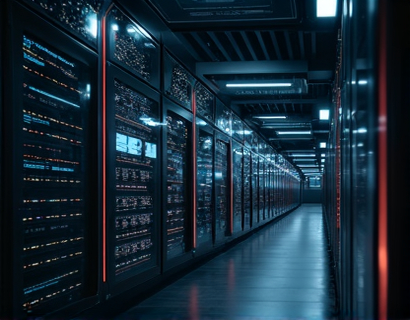Autonomous AI Agents: Revolutionizing Business Efficiency Through Multi-Chain and Cross-Technology Automation Solutions
In the rapidly evolving digital landscape, businesses are constantly seeking innovative ways to enhance efficiency and maintain a competitive edge. One of the most transformative advancements in this realm is the emergence of Autonomous AI Agents. These intelligent entities are designed to operate seamlessly across multiple blockchains and various technologies, automating complex tasks and optimizing workflows with advanced AI solutions. This article delves into the capabilities, benefits, and future potential of Autonomous AI Agents, providing businesses with insights into how these technologies can revolutionize their operations.
Understanding Autonomous AI Agents
Autonomous AI Agents are sophisticated software entities that can perform tasks with minimal human intervention. These agents leverage machine learning, natural language processing, and other AI techniques to understand, adapt to, and execute tasks in dynamic environments. The key feature of these agents is their ability to operate across different blockchain networks and technological platforms, ensuring a high degree of flexibility and interoperability.
The foundation of Autonomous AI Agents lies in their advanced algorithms and data processing capabilities. These agents can analyze vast amounts of data, identify patterns, and make decisions based on predefined criteria. By integrating with multiple blockchains, they can access and manipulate data from various sources, enhancing their functionality and utility. This cross-chain capability is crucial for businesses that operate in decentralized ecosystems or need to integrate data from multiple blockchain-based systems.
Multi-Chain Automation
One of the most significant advantages of Autonomous AI Agents is their multi-chain automation capabilities. Traditional automation solutions often struggle with interoperability across different blockchain platforms, leading to fragmented systems and increased operational complexity. Autonomous AI Agents bridge this gap by providing a unified automation framework that can seamlessly interact with multiple blockchains.
For instance, in a supply chain management scenario, an Autonomous AI Agent can coordinate transactions across various blockchain networks, ensuring real-time tracking and verification of goods. This agent can automate processes such as order placement, payment processing, and inventory management, all while maintaining transparency and security. The ability to operate across multiple blockchains not only streamlines operations but also reduces the risk of errors and fraud.
Cross-Technology Integration
Beyond blockchain, Autonomous AI Agents are designed to integrate with a wide range of technologies, including IoT devices, cloud platforms, and traditional enterprise systems. This cross-technology integration enables a holistic approach to automation, where data and processes flow smoothly between different systems.
Consider a manufacturing company that uses IoT sensors to monitor equipment performance. An Autonomous AI Agent can collect data from these sensors, analyze it in real-time, and trigger maintenance requests or adjustments to production lines. The agent can also integrate with cloud storage solutions to store and manage large datasets, ensuring that the company has access to up-to-date information for decision-making. By connecting various technological layers, these agents create a cohesive and efficient operational environment.
Benefits of Autonomous AI Agents
The implementation of Autonomous AI Agents offers numerous benefits for businesses, including enhanced efficiency, cost reduction, and improved decision-making.
Firstly, these agents significantly boost efficiency by automating repetitive and time-consuming tasks. For example, in financial services, an AI agent can handle routine transactions, compliance checks, and reporting, freeing up human resources to focus on more strategic activities. This not only speeds up processes but also reduces the likelihood of human error.
Secondly, Autonomous AI Agents help businesses reduce operational costs. By automating manual tasks, companies can lower labor expenses and minimize the need for extensive IT infrastructure. Additionally, the predictive capabilities of these agents can optimize resource allocation, further contributing to cost savings.
Thirdly, the data-driven insights provided by Autonomous AI Agents enhance decision-making. These agents can analyze complex datasets and provide actionable recommendations, enabling businesses to make informed decisions quickly. In the retail sector, for instance, an AI agent can analyze customer behavior and market trends to suggest optimal pricing strategies and inventory levels.
Case Studies and Real-World Applications
Several industries have already begun to leverage Autonomous AI Agents to transform their operations. Here are a few notable examples:
- Supply Chain Management: A global logistics company implemented AI agents to manage cross-border shipments. These agents automated customs clearance, payment processing, and route optimization across multiple blockchain platforms, resulting in a 30% reduction in delivery times and a significant decrease in operational costs.
- Healthcare: A leading hospital network deployed AI agents to streamline patient data management. These agents integrated data from various sources, including electronic health records and IoT devices, to provide real-time insights into patient conditions. This not only improved patient care but also enhanced the efficiency of hospital workflows.
- Finance: A major bank introduced AI agents to automate fraud detection and compliance monitoring. These agents analyzed transaction data across multiple blockchain networks and traditional databases, identifying suspicious activities with high accuracy and minimal false positives. This has led to a more secure and efficient financial ecosystem.
Challenges and Considerations
While the potential of Autonomous AI Agents is vast, there are several challenges and considerations that businesses should be aware of:
Firstly, the development and deployment of these agents require significant expertise in AI, blockchain, and software engineering. Companies need to invest in skilled personnel or partner with technology providers to ensure successful implementation.
Secondly, ensuring the security and privacy of data is paramount. Autonomous AI Agents handle sensitive information, and any breach can have severe consequences. Implementing robust security measures and adhering to regulatory standards are essential.
Thirdly, the integration of multiple technologies and blockchain networks can be complex. Businesses must carefully plan and test the integration to avoid disruptions in their operations. Pilot projects and phased rollouts can help mitigate risks and ensure smooth transitions.
Future Trends and Innovations
The future of Autonomous AI Agents looks promising, with several trends and innovations on the horizon:
First, the advancement of edge computing will enable AI agents to process data closer to the source, reducing latency and improving real-time decision-making. This is particularly beneficial for IoT-driven applications where immediate responses are critical.
Second, the development of more sophisticated AI models, such as federated learning, will enhance the ability of agents to learn from decentralized data sources without compromising privacy. This will further expand the applications of AI agents in sensitive industries like healthcare and finance.
Third, the integration of AI agents with augmented reality (AR) and virtual reality (VR) technologies can create immersive and interactive user experiences. For example, in training and simulation, AI agents can guide users through complex tasks in a virtual environment, enhancing learning outcomes.
Conclusion
Autonomous AI Agents represent a significant leap forward in business automation and efficiency. By seamlessly integrating across multiple blockchains and technologies, these agents offer a comprehensive solution for streamlining operations and optimizing workflows. As businesses continue to navigate the digital transformation, embracing Autonomous AI Agents can provide a competitive advantage, driving innovation and growth in an increasingly complex and interconnected world.










































